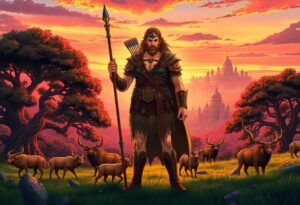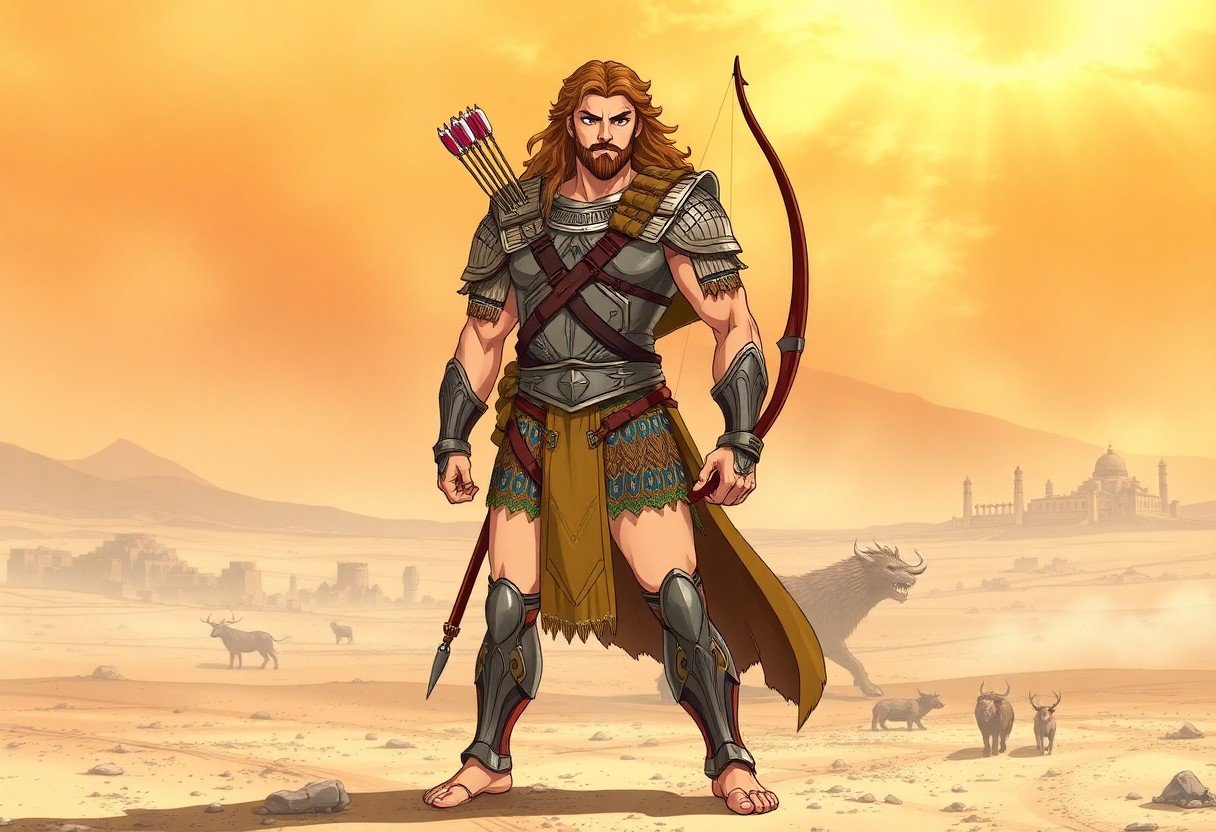You may have heard of Nimrod as a figure in the Bible who is often associated with strength and ambition. Found primarily in the Book of Genesis, Nimrod is described as a mighty hunter and the founder of several key kingdoms, including Babel and Assyria. His narrative serves as a backdrop for themes such as human ambition, the desire for power, and the consequences of defiance against divine intentions. In your exploration of Nimrod’s life, you will uncover spiritual lessons that resonate even today while reflecting on the unique role he plays in biblical history.
The Biblical Narrative of Nimrod
A prominent figure in the Bible, Nimrod is famously described as a mighty hunter and a ruler of kingdoms. His narrative emerges primarily in the Book of Genesis, where he is depicted as the founder of Babylon and notable cities like Nineveh. As you investigate into his story, you uncover themes of ambition, strength, and the pursuit of power, which ultimately shape the early world and its civilizations.
Nimrod’s Lineage and Early Life
Beside his mighty reputation, you should note that Nimrod’s lineage can be traced back to the descendants of Ham, specifically as a great-grandson of Noah. This heritage placed him in a significant cultural context, setting the stage for his influential rise as a leader and hunter. His family background hints at a blend of abilities and traits that would define his character and his future endeavors in establishing kingdoms.
The Role of Nimrod in the Book of Genesis
About his impact, you’ll find that Nimrod symbolizes both human achievement and rebellion against God. He is described in Genesis 10:8-12 as not only a skilled hunter but also the founder of major cities. His ability to wield power reflects humanity’s desire to establish dominion in the world. This legacy raises questions about ambition, authority, and the broader implications of striving for greatness separate from divine guidance.
Nimrod, with his formidable hunting prowess, serves as a key representation of human ambition and the quest for power. His founding of cities like Babel illustrates a mixture of strength and pride, echoing humanity’s desire to make a name for themselves. This ambition, while impressive, also serves as a warning to you about the dangers of striving for accomplishments without seeking God’s purpose. His story urges you to reflect on the balance between ambition and humility in your pursuits.

Nimrod as the Mighty Hunter
Now, you may find it intriguing that Nimrod is often depicted as a mighty hunter in the Bible. His prowess in hunting symbolizes strength, skill, and leadership—qualities that helped him become a notable figure in the post-flood world. Revered for his abilities, he set the stage for his legacy as the founder of mighty kingdoms, proving that his hunting was not merely for survival but a means of asserting his dominance and influence.

Psalm 56:3
49.99$The Significance of Hunting in Ancient Cultures
Ancient cultures often viewed hunting as a vital activity, integral to survival and a reflection of societal values. Successful hunters were celebrated and esteemed, embodying strength and bravery. As a delicacy, game meat also elevated social status, while hunting skills were necessary in warfare and community cohesion. This cultural reverence for hunting shaped the relationships between leaders and their people.
Nimrod’s Legacy as a Hunter and Leader
With Nimrod’s remarkable reputation as a hunter, you can appreciate how it laid the foundation for his legacy as a leader. His hunting exploits not only showcased his physical abilities but also bolstered his leadership status. These traits offered him the authority to unite people, which ultimately led to the establishment of several significant cities, including Babel. His impact as both a hunter and a leader resonates through generations.
At the heart of Nimrod’s legacy lies the symbolism of power and authority. His skills in hunting provided him a reputation that attracted followers, allowing him to exert significant influence in the ancient world. As the founder of cities such as Babylon, he demonstrated leadership qualities that were pivotal for unifying and organizing communities. Beyond the mere act of hunting, his narrative emphasizes how personal abilities can lead to broader societal impact, illustrating the balance between individual prowess and collective governance.
The Foundation of Kingdoms
You will discover how Nimrod’s legacy significantly shaped the ancient world, particularly as he laid the groundwork for various kingdoms. His innovative spirit and leadership led to the formation of structured societies that transcended mere survival, showcasing advancements in governance, culture, and economy. As the founder of notable cities and kingdoms, Nimrod exemplifies the impact one individual can have in molding history and influencing generations to come.
Nimrod’s Role in Establishing Babylon
Babylon emerged as a prominent city under Nimrod’s rule, marking the beginning of a powerful civilization. He played a pivotal role in its establishment, symbolizing humanity’s ambition and ability to create vast societies. The city’s location facilitated trade and communication, making it a cultural and political epicenter that honored Nimrod’s vision.
The Expansion of Nimrod’s Influence
By uniting various tribes and establishing cities, Nimrod’s influence rapidly spread across the ancient Near East, effectively becoming a dominant figure in the region. His exceptional hunting skills and leadership were symbolic of power and strength, attracting followers and aspiring leaders. The foundations he laid influenced not only geopolitical dynamics but also the cultural practices of the territories under his reign.
Establishing strong alliances and fostering communal developments, Nimrod’s endeavors were crucial in expanding his influence beyond Babylon. His ambition led to the establishment of other cities like Nineveh and Calah, promoting trade, arts, and the exchange of ideas. This integration fostered a unique blend of cultures and practices that would shape the development of future civilizations. Nimrod’s legacy served as a blueprint for political and social organization, impacting societies long after his time, as his powerful narrative continued to resonate throughout history.
Nimrod’s Symbolism and Cultural Impact
Despite being a biblically ambiguous figure, Nimrod symbolizes strength, ambition, and the spirit of rebellion. His legacy as a mighty hunter and builder of kingdoms resonates not only within scripture but also in cultural narratives that explore themes of power and authority. Nimrod’s ambitions echo the aspirations of humanity to transcend limitations, often serving as a cautionary representation of hubris and disobedience to divine will.
Interpretations of Nimrod in Various Traditions
For many, Nimrod has been interpreted through a diverse lens, ranging from a hero of human innovation to a symbol of tyranny. Jewish, Christian, and Islamic traditions offer differing perspectives on his character, often focusing on the implications of his actions, which provoke thoughts on moral lessons about leadership, governance, and the nature of free will.
Nimrod in Art and Literature
Across centuries, artists and writers have drawn inspiration from Nimrod’s narrative, illustrating varying interpretations of his character. Artists depict him as a heroic figure, highlighting his prowess as a hunter, while literature often critiques his ambition and pride. This duality reflects ongoing human struggles with power and the moral implications of ambition.
The impact of Nimrod’s portrayal in art and literature is significant, as it invites deeper reflection on societal values and the complexity of human nature. Renaissance paintings, folk tales, and modern interpretations showcase Nimrod’s character as both a cautionary tale and an embodiment of human ingenuity. You may find his story served as an allegory for political power and the allure of greatness, while also reminding you of the pitfalls that accompany unchecked ambition. His character transcends boundaries, influencing diverse cultural expressions, urging a re-examination of what it means to be mighty.
Historical Perspectives on Nimrod
Keep in mind that the historical perspectives on Nimrod illuminate much about the character and his impact on ancient civilizations. As you explore these perspectives, you will uncover how Nimrod’s identity as a mighty hunter and kingdom founder resonates throughout history, influencing various cultures and traditions. By engaging with both biblical and extra-biblical narratives, you can appreciate the lasting legacy of this enigmatic figure on the world around you.
Archaeological Evidence and Historical Accounts
About Nimrod, archaeological evidence reveals that his story is intertwined with significant historical accounts from ancient Mesopotamia. Excavations in regions such as Assyria and Babylon indicate the rise of powerful rulers who may have been inspired by or linked to Nimrod’s legacy. The artifacts discovered provide insights into the culture, rituals, and governance that hint at his possible existence beyond the biblical text.

Psalm 56:3
49.99$The Connection Between Nimrod and Mesopotamian Kingship
Along with Nimrod’s narrative, you will find fascinating connections to Mesopotamian kingship traditions. Mesopotamia was home to some of the earliest known civilizations, and kingship often revolved around the themes of strength, governance, and divine favor. Nimrod represents an archetype of a ruler whose immense power shaped the political landscape and cultural identity of the region, marking him as a significant figure in early history.
Considering these connections helps you understand how Nimrod’s story aligns with the broader context of Mesopotamian kingship. Many rulers of that era were seen as semi-divine figures, embodying the qualities of strength and resilience that Nimrod represents. This association of kingship with divine favor underscores not only the significance of Nimrod in the biblical narrative but also his enduring impact on historical and cultural perceptions of leadership in ancient civilizations.
Theological Insights
To appreciate Nimrod’s influence, consider how his actions reflect a desire for power and independence from God. Nimrod’s legacy raises important questions about human ambition and the pursuit of greatness. His kingdom-building efforts serve as a reminder of the potential pitfalls associated with pride and rebellion against divine authority. Understanding Nimrod’s story within the broader biblical narrative encourages you to reflect on the consequences of seeking your own agenda, rather than embracing God’s purposes for your life.
Nimrod in Jewish Tradition
To see Nimrod through Jewish tradition, you find that he is often interpreted as a symbol of rebellion against God. In various texts, he is characterized as a tyrant who led the people astray, promoting idolatry and defiance against divine authority. This perspective highlights the importance of humility and obedience in contrast to Nimrod’s ambition, ultimately serving as a cautionary tale regarding the risks of straying from God’s path.
Christian and Islamic Views of Nimrod
With differing views in Christianity and Islam, Nimrod is generally seen as a figure associated with tyranny and misguidance. In Christianity, he is often linked to the Tower of Babel narrative, representing humanity’s attempt to reach God through their own efforts. In Islam, he is regarded as a king who opposed the prophet Abraham, highlighting his role as a symbol of oppression and disbelief. Each tradition underscores the danger of placing power above faith.
Nimrod serves as a significant figure in the narratives of both Christianity and Islam, representing authority that stands in opposition to divine will. In Christian texts, his connection to the Tower of Babel illustrates humanity’s futile attempts to achieve greatness without God’s guidance. In Islamic tradition, he is depicted as the antagonist to the prophet Abraham, embodying the consequences of arrogance and disbelief. Both interpretations invite you to consider the dangers associated with pride and the importance of surrendering to divine authority in your life.
Conclusion
As a reminder, Nimrod’s story in the Bible highlights the complexities of human ambition and leadership. You can draw from his legacy as a powerful hunter and kingdom builder, understanding both the strengths and potential pitfalls of such pursuits. His tale prompts reflection on how you might balance ambition with humility and faithfulness to God’s purpose in your own life. Ultimately, Nimrod serves as a reminder of the lasting impact one’s choices can have on history, urging you to seek a path that aligns with divine principles.
“And Cush begat Nimrod: he began to be a mighty one in the earth. He was a mighty hunter before the LORD: wherefore it is said, Even as Nimrod the mighty hunter before the LORD. And the beginning of his kingdom was Babel, and Erech, and Accad, and Calneh, in the land of Shinar. Out of that land went forth Asshur, and builded Nineveh, and the city Rehoboth, and Calah, And Resen between Nineveh and Calah: the same is a great city.”
(Genesis 10:8-12)








